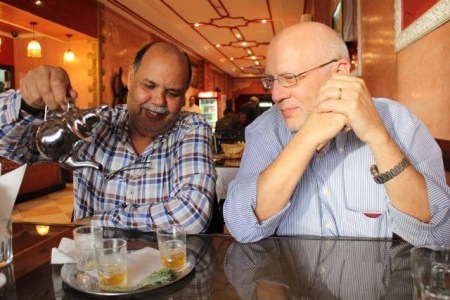Following a NY Times expose, here’s been much ado in the twittersphere about maca. But that’s not the only Andean tuber with a smuggling problem. Including to Italy, though?
Nibbles: Quasilocavore, Returning potatoes, Singapore veggies, Floating gardens, Timber trees, Allanblackia, Cranberry glut, Wild turkeys
- Sure, eat locally. But not too much.
- Andean farmers don’t have much of a choice about eating locally, but at least now they have more potato varieties to choose from.
- Growing your own is about as local as you can get in Singapore.
- Maybe they should do it the Bangladeshi way.
- A list of the world’s commercial timber trees (pdf). Can’t help thinking they should have made more of this.
- Which doesn’t include Allanblackia.
- Let them eat cranberries.
- Wild turkey with that?
Nibbles: Hunger Games, Nutritious markets, Plant secrets, Nutrition soundbites, Buckwheat panic, Olive oil panic, Cannabis breeding, Wild turkey genetics, Quinoa wars, Domestication infographics, Howard-Yana Shapiro
- Do they know it’s Christmas? Stocking-filling books for do-gooders.
- Wonder if any of them talk about using markets to deliver nutritious food.
- The surprising secrets of baobabs, among other plants. I thought we knew all there was to know about baobabs, what with all those factsheets.
- The Global Nutrition Report in 12 sound-bites. No sign of baobabs.
- Russians in a tizzy about their buckwheat. If only they’d had a factsheet.
- Everybody in a tizzy about European olive oil. Maybe they should try the American stuff?
- “When skunk was created the people doing it had no idea they were altering the ratios of CBD and THC — they just kept breeding the plants that gave the strongest high and threw the rest away.” Ouch. But fear not, help is at hand.
- Restoring wild turkey populations is screwing up its subspecific structure, pissing off taxonomists no end.
- Bolivians do not appreciate cheap Peruvian quinoa. Hipsters unavailable for comment.
- No, LA’s wild quinoa is not going to put too much of a dent in global food shortages, nor interest many hipsters, but it’s a fun story. Too bad wasn’t mashed up with the US crop wild relatives prize-winning paper.
- Cool crop domestication infographics.
- Plant geneticists are from Mars.
Moroccan medicinal mint tea

That’s me on the right in Rabat last week, having a post-prandial drink with Dr Ahmed Amri, head of the ICARDA genebank. I post the photo (taken by my colleague Charlotte Lusty) by way of explanation for the lack of blogging lately, and also as an excuse to link to the beta version of Kew’s Medicinal Plant Names Service, which I have just become aware of. You see that bit of greenery on the tea tray? It’s a plant that’s sometimes added to mint tea in Morocco during the winter. It’s called “absinthe” there. If you want to know the Latin name, you can look it up here.
Nibbles: Chocolate, MAS, Cash crops, Medicinal plants, Rice domestication, Cat genome, Banana research, Artichoke history, Root vegetables, Diabetes data, eMonocot, Paris herbarium, Appleseed, Seed saving, Potato safety duplication, Seed atlas, Botanical Jurassic Park, Mapping urban fruit, Midwest road trip, Iraqi marshes, World Digital Library, World Parks Congress, Plant demography
- Ok here goes, there’s a week’s work of Nibbles we’ve got to catch up on.
- World running out of chocolate! Tell that to Cologne.
- Yeah well I prefer tea to cocoa.
- Greenpeace: “Smart breeding” will save us, not GMOs. Breeders: All breeding is smart.
- Guess the world’s biggest cash crop. Yeah, that one.
- Alas, it’s not included in the recent strategy for conserving medicinal plants. Not that it would need conserving.
- The domestication of the world’s biggest crop, period. Deconstructed. And if you want to drill down.
- And of the world’s biggest fruit.
- And of the world’s biggest pet.
- And of the world’s most difficult to eat vegetable.
- Root “vegetables” made simple. Because winter.
- And why you must eat your veggies, including the difficult ones.
- Videos on Kew’s monocot database and on the renovation of another famous herbarium.
- The real Johnny Appleseed.
- But you too can save seeds, just like Johnny.
- But don’t forget to safety duplicate, like CIP has done, at Embrapa.
- And this shows you what those seeds can look like.
- You don’t necessarily need seeds to save plants, though.
- Mapping fallen fruit. Because we can.
- Road trip!
- Boat trip!
- Selected Techniques in the Art of Agriculture. From French to Turkish to Arabic. One of many nifty agriculture-related resources in the World Digital Library.
- Oh yeah, the IUCN World Parks Congress has been on and its all over the intertubes. Including with neat visualizations, natch.
- How many of the species in the COMPADRE database of plant demography information are in protected areas? How many are crop wild relatives? I need an intern.